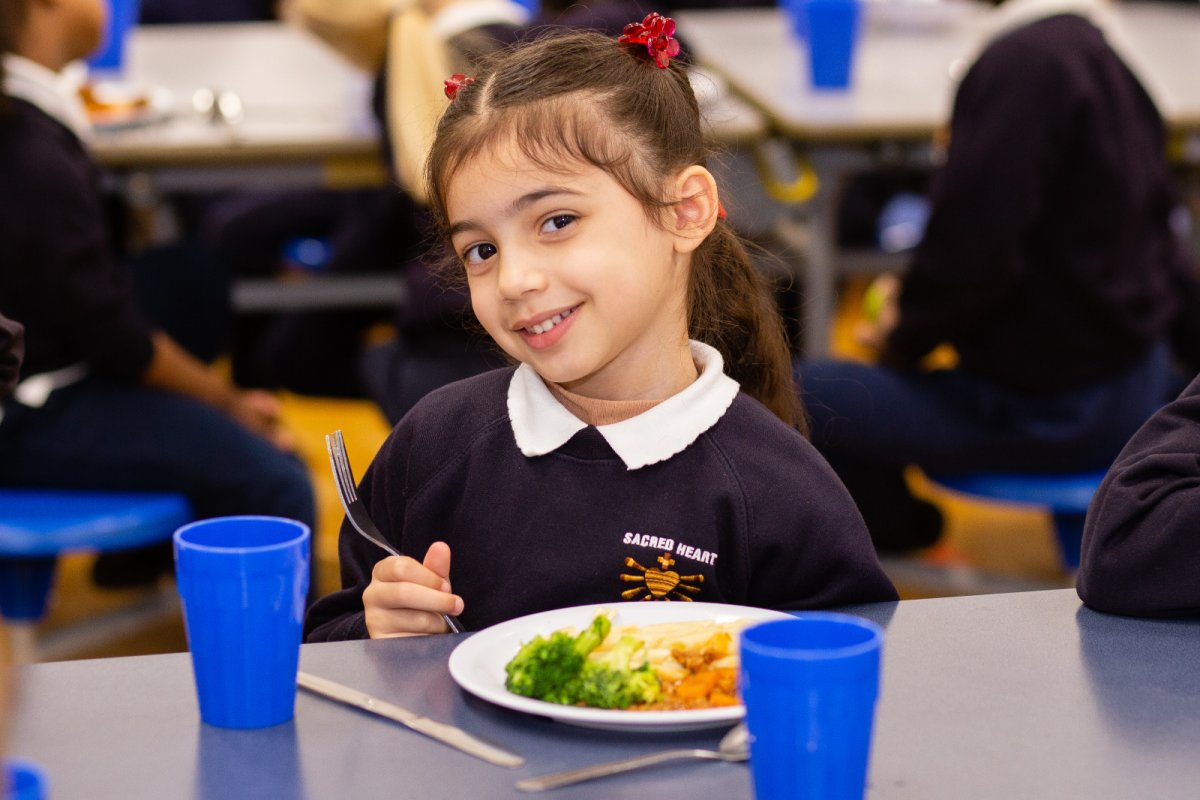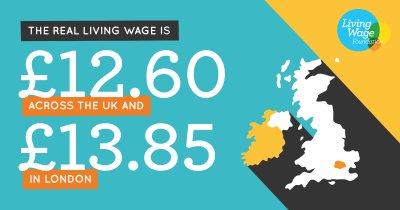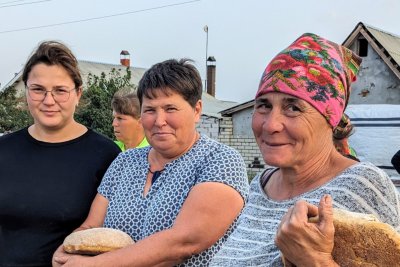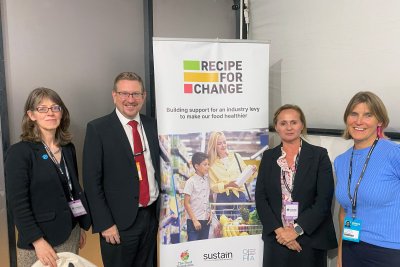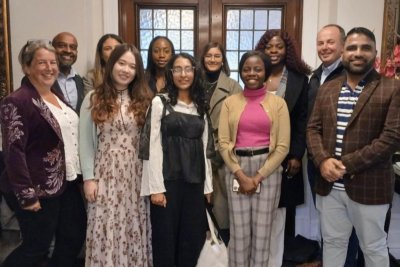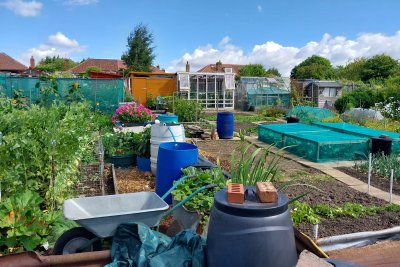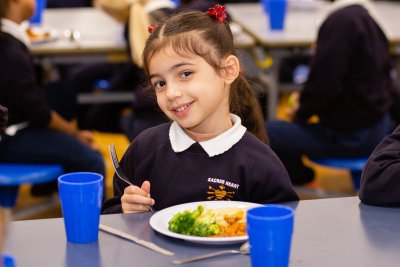 Enjoying a healthy lunch at Sacred Heart School, Battersea. Credit: Jon Goldberg / Children's Food Campaign
Enjoying a healthy lunch at Sacred Heart School, Battersea. Credit: Jon Goldberg / Children's Food Campaign
National School Meals Week: how can we ensure everybody benefits?
As schools and caterers across the country celebrate National School Meals Week, Children’s Food Campaign Officer Naema Jannath and Campaign Manager Barbara Crowther take stock of the progress and continuing challenges of delivering healthy School Food For All.
Happy National School Meals Week!
It’s National School Meals Week, the annual celebration organised by the Local Authority Caterers’ Association (LACA) to celebrate the benefits of healthy, hot school lunches, and encourage all schools to put good food on the plate, and recognise the hard work of the people who make it.
Schools will be inviting their local MPs and dignitaries to come dine with them too, which will be a great opportunity not just to eat lunch, but also have a conversation about what needs to change in relation to food quality, funding systems and pupil entitlement to build a more sustainable, healthy school food vision for the future. As part of NSMW’s 30th anniversary, we have created this useful resource for MPs to take with them when visiting schools.
'Say Yes to School Food for All' is heading to 10 Downing Street
One thing we learnt from research conducted with politicians earlier this year, is that every single MP across the political spectrum gets the link between good nutrition and ability to concentrate and learn.
We believe school food should be treated as all other enablers of good learning such as desks, chairs, books and bathrooms – none of which are means tested in the way lunch is. Nor is food in other public settings that routinely feed us, such as hospitals and prisons.
Since the launch of our Say Yes campaign earlier this year, thousands of individuals, organisations, community groups and a growing number of MPs have expressed their support for school food for every UK child.
- We’ve seen evidence of the economic return on investment from PwC and Impact on Urban Health, of £1.71 for every pound invested in healthy school food on a universal basis.
- We’ve heard concerns about the ‘cliff edge’ of the current threshold approach to entitlement from the Institute for Fiscal Studies, something we know many MPs are also concerned about.
- We’ve learnt from researchers at the University of Essex that there is a clear association between universal provision of meals and a slowing down of the trend on obesity prevalence in four London boroughs.
- Listerning to young people themselves, it is clear that only a universal system that is capable of eliminating the stigma felt by children from lower-income households. The Youth Parliament will be debating universal school meals in the House of Commons, as part of their cost of living work.
Say Yes wants to ensure that every child can enjoy nutritious school meals, regardless of income, location, or learning ability. If you agree that every child deserves this right, add your name to our map. We will be delivering this on November 17th in collaboration with the UK Youth Parliament and British Youth Council, on the same day they hold their own sitting in the House of Commons.
A manifesto for better food in school
Ten years on from the School Food Plan, which ushered in Universal Infant Free School Meals, enshrined cooking skills in the school curriculum to 16, and strengthened School Food Standards, we believe it’s time for another major school food review. Ahead of the next general election, the School Food Review Group and its 30 members have launched a joint manifesto. It calls on the Government to commit to a continual cycle of improvement to three essential parts of the school food system required to deliver nutritious and delicious school food, and ensure every child has the adequate nutrition they need to thrive in school and achieve.
The three pillars are:
- Equitable Access to Free School Meals – giving every child access to hot, nutritious food
- Quality of Food Provision – ensuring all food on the plate is nutritious and sustainable
- Fairer Funding – to make it easy for schools, caterers, administrative staff to provide nutritious and sustainable food
Nick Capstick, chair of the School Food Review Working Group says:
“Our vision is for every child to receive the nutrition they need to thrive. The next Government has the opportunity to create a school food system that maximises pupil and school outcomes, giving every child the opportunity to fulfil their potential.”
London primaries get school food for all
Thanks to additional funding of £135 million from the Mayor of London, school lunches are now being provided to all pupils in maintained primary schools across the capital. To put this in context, up until now, children in primary school years 3 to 6 were only eligible for free school meals if their households earned less than £7,400 per year after taxes, with no consideration for family size or cost of living in London.
Mayor of London, Sadiq Khan says:
“I know from personal experience what a lifeline free school meals can be and I’m immensely proud that our unprecedented funding means that hundreds of thousands of children across London’s primary schools are now benefitting from them.”
In every corner of London, each borough has received funding of £2.65 per meal to support schools to serve up nutritious meals throughout the academic year. Whilst some schools and boroughs are further topping up this funding from their own budgets, it compares to government funding of just £2.53 per meal during 2023/24 (itself an increase from previous year’s funding of just £2.41 but still falling far below what caterers now estimate the real costs of provision are).
Boroughs and schools have also been provided with additional guidance in a new Free School Meals Hub on a range of topics, including measures to boost parents' enrollment in the benefit-entitled Free School Meal scheme, recognising the importance of this for ensuring maximum additional Pupil Premium funding for schools.
Three London boroughs already providing universal primary meals have been redirecting funding to drive school improvement programmes – with Southwark expanding meal entitlement to secondary pupils from households on Universal Credit, Westminster additionally providing meals for all pupils in nurseries and Key Stage 3, and Tower Hamlets have introduced universal secondary meals.
With so much activity in London, there will be much to learn during the 2023/24 academic year and several evaluation and monitoring projects will also seeking to identify good practice, ongoing barriers and the impact of expanded meal offers.
All eyes will be on the Mayoral elections for 2024, and whether continuation of the programme will be part of the manifesto or not. Conservative Mayoral candidate Susan Hall pledged during her selection campaign to continue the initiative for as long as needed, including 2024/25, so watch this space!!
Scotland and Wales
In 2020, the Scottish Government committed to extending school meals to all primary-aged pupils in Scotland, prior to it only being available to pupils in years P1 to P3 (ages 5–7). There have been challenges, such as kitchen and dining facilities in schools meeting the increase in demand, and additional investment being needed to upgrade and find alternative solutions. So far the programme has reached all pupils up to P5, with a more targeted approach for pupils in P6 and P7 in receipt of the Scottish Child Benefit currently being developed. Some local authorities, including Inverclyde, have already achieved full primary meal roll out.
In Wales, the Government has committed free school meals to all primary school by 2024. This commitment is in response to the rising cost-of-living pressures on families. In particular areas such as Neath Port Talbot, have rolled out UFSM to all primary school children since September 2023, a year ahead of schedule. However, concerns have also been raised that the Welsh Government is no longer providing central funding for school meals during holidays, with local councils now picking up all responsibility for delivery of holiday vouchers, activity clubs and food.
Finding local solutions
Across the country, we are hearing of more and more examples of schools, councils, community groups and charitable organisations picking up on the desire to see expansion of healthy meals to more children, with local campaigns and by allocating funds from their own budgets.
Southampton
Headteacher John Draper of Swaythling Primary School in Southampton, for instance, has gone above and beyond, offering additional free school meals to children on universal credit for a second academic year through his initiative called 'Operation Moonshoot' which he describes in this blog.
John is clear that universal meals is a shared vision, but is also a pragmatist.
“Surely though, if that’s not immediately affordable, we must do something. Widening eligibility to all families who qualify for universal credit must be an urgent priority on the road to ensuring that every child who attends our school has access to at least one hot, nutritious meal a day.”
Bath and North East Somerset
The St John’s Foundation, an 850 year-old charity, has been supporting six primary schools across Bath and North East Somerset with a universal offer, serving up an additional 25,000 meals to more than 300 pupils from January to August 2023. St. John's is actively working on providing breakfast support, weekend, and holiday meals within these schools. This initiative not only eases the financial strain on families during the cost-of-living crisis but also recognises the pivotal role of food in their mission to close the attainment gap in Key Stage 2.
The response from parents has been overwhelmingly positive, with impacts on children's food intake as well as family budgets. One said:
“My daughter no longer comes out of school complaining she is hungry and now eats different foods she would not normally eat at home. It has also had an impact on our family's financial situation as purchasing a packed lunch for all my children has become quite expensive. I have been able to sign my daughter up for gymnastic lessons with the money I am saving - something I struggled to afford before.”
St. John's is pleased to highlight the positive impact of universal school food access and the long-term benefits it provides, and provide this critical support at this tough economic time for families. However, recognising that it can’t be their own ongoing sole responsibility to continually support school feeding, the Foundation is also supporting our Say Yes to School Food For All campaign to push for a nationwide government solution.
Stockport
Over 900 children are now benefitting from a new School Meal Support Scheme being run by Stockport Council. Support is available to children aged between seven and 18 years old living in the borough and attending an education setting during the 2023/24 academic year whose parents/carers are in receipt of Local Council Tax Support and/or Housing Benefit. This includes children who live in the borough but attend a school or college outside of Stockport.
A total of 945 children are currently being supported by the scheme for the academic year 2023/24, with the council working in partnership with 150 school and college settings, including 46 schools and colleges outside of the borough. The support is worth around £500 per child, enabling the children to receive a paid-for meal each day of term over the academic year when attending their school or college.
Stockport Councillor Jilly Julian says:
“The scheme means that every Stockport child living in a low-income family will have the opportunity to receive a free meal every school day for the next academic year, regardless of whether they go to school or college within our borough or not.”
Yorkshire
Another way some areas are boosting access to school meals is by focussing on the children who are not currently taking up their entitlement to free school meals, estimated to be around 11% of those eligible. FixOurFood represents a cross-disciplinary research initiative, centred at the University of York. Sheffield has had huge success with automating enrolment for eligible families through an opt-out rather than opt-in process, leading to a significant uptake in free school meals in the area. They have found through their school observation days, the need for additional time, resources, and compulsory policies. No two schools are the same and most have the willingness to improve their food provision. They are working with Sheffield to encourage other areas of Yorkshire to do the same, and learning from this programme is now being shared with other local authorities interested in boosting uptake of children who are eligible.
What more can local areas do?
The Children’s Food Campaign and Sustainable Food Places network jointly held a webinar exploring local roadmaps towards school food for all, to share how different local areas are working on school food improvement in different ways – from mobilising young people and local communities, to conducting feasibility and pilots, to lessons that can be learnt from areas that are already rolling out expansion. We’ll be talking about this in a future blog post, but the webinar and presentations are available online here.
It’s all still a postcode lottery….
Unfortunately, not all local authorities and educational institutions have sufficient funding at their disposal. It's crucial that children's health and education are not subject to uncertainty. The government needs to step in and embrace a forward-looking approach to extend access to school food for all children across the entire United Kingdom.
This is why we are asking MPs to stand up for the children in your area and end the postcode lottery on school food once and for all. Support our cause by taking the quick two minute e-action.
Are we making progress politically?
Many politicians from all the main parties have pledged their support during our May Parliament drop in and agree that something must change. Lib Dems have committed to extending free school meals to every child in primary school and to secondary school pupils whose families receive Universal Credit. The Green Party wants the government to go even further and provide free school meals to all children in primary and secondary education. Whilst the Labour Party has committed to universal free breakfast clubs and has consistently criticised the £7400 eligibility threshold for school lunches as inadequate, it has yet to commit to reviewing and reforming entitlement, despite huge pressure from their own membership, and clear evidence that current and prospective Labour voters are massively in favour of a staged roll out of entitlement. Meanwhile the Government will only say that it is keeping the situation ‘under review’.
What do the public say?
On the other hand, there is a huge public support for school food for all. The latest research shows seven in 10 people believe the current threshold of entitlement for free school meals (just £7400 annual income) is too low, or simply should not exist at all. When researchers from Fix our Food at the University of York asked over 300 schoolchildren what they would do to make school food better, school food for all was the number one priority.
Meanwhile, the National Education Union’s massive Free School Meals For All campaign has secured the support of 90,000 signatories and over 25 high profile figures from sport, music and drama including Ed Sheeran, Dua Lipa, Kate Winslet, Gary Lineker in supporting the campaign to win free school meals for primary school children.
Our Say Yes to School Food for All map aims to keep up that momentum, with almost 1000 organisations, community groups and other signatories showing the strong support for school meals. They include MPs from all the main political parties, charities, locals councils, local food partnerships and young people.
It’s not too late to add your name before we head to Downing Street on 17 November! So if you only do one thing during National School Meals Week, get yourself the map, or ask someone you know to join!
Children's Food Campaign: Better food and food teaching for children in schools, and protection of children from junk food marketing are the aims of Sustain's high-profile Children's Food Campaign. We also want clear food labelling that can be understood by everyone, including children.
Sustain
The Green House
244-254 Cambridge Heath Road
London E2 9DA
020 3559 6777
sustain@sustainweb.org
Sustain advocates food and agriculture policies and practices that enhance the health and welfare of people and animals, improve the working and living environment, promote equity and enrich society and culture.
© Sustain 2024
Registered charity (no. 1018643)
Data privacy & cookies
Icons by Icons8
